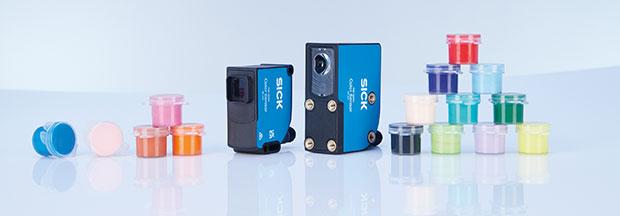SICK has announced a major advance in its colour sensor portfolio, with the launch of its CSS and CSX high resolution and high-speed devices. SICK’s newly developed flagship CSS colour sensor leads the way with best-in-class colour resolution and the ability to distinguish even the slightest nuances in shade. Its capability to identify subtle differences in surface structures and textures opens up wide-ranging applications in logistics materials handling.
 The SICK CSS Colour Sensor detects colours precisely, regardless of the distance from the object, at lengths of up to 500mm. Its unique distance regulation capability dispenses with the need for strict guidance of the target. It therefore accommodates changing sensing distances automatically on a production line, e.g. to account for differing orientations of a product on a conveyor, and to handle varying object sizes with ease.
The SICK CSS Colour Sensor detects colours precisely, regardless of the distance from the object, at lengths of up to 500mm. Its unique distance regulation capability dispenses with the need for strict guidance of the target. It therefore accommodates changing sensing distances automatically on a production line, e.g. to account for differing orientations of a product on a conveyor, and to handle varying object sizes with ease.
Live On-sensor Values
Live L*A*B* or RGB colour values are displayed directly on the CSS’s on-sensor full-colour display. An innovative teach-in method enables the sensor to assess the similarity between the detected colour and expected colour in real time. Up to 15 colours can be output directly via the sensor’s four switching outputs. The SICK IO-Link CSS Colour Sensor also offers the unmatched capability to output up to 24 colours to a machine controller. The SICK CSS goes far beyond sensing homogenous colours, opening up a wide field of applications, and is even an attractive alternative to expensive colour measurement devices, in some cases.
CSX High Speed
With a switching frequency of 13.8kHz, the SICK CSX High Speed sensor works at double the pace of its predecessor device, while still offering customers the option of full mounting compatibility for direct replacement. As well as typical applications such as the detection of colour marks, labels and splices, the CSX now masters new high-speed production tasks such as rapid sorting of objects according to colour. “SICK’s colour sensor portfolio has undergone a major overhaul, culminating in some of the best colour sensing capability currently available,” explains David Hannaby, SICK’s market development manager for presence detection.
“These two devices now offer best-in-class performance, as well as combining unmatched colour recognition with ease of set-up and the ability to adjust the colour sensitivity precisely. Using the new multi-value teach-in method, it’s easy to teach in material with structure, such as stone, wood, fabric or leather and get a reliable result.
“The automatic sensing distance regulation enables the CSS to detect colours reliably, despite the difference that changing distances have on the perceived colour; it can handle differences in distance between 50mm and 500mm with ease.”
Higher Process Speeds
The CSS and CSX colour sensors help to achieve higher process speeds and higher throughputs with outstanding detection repeatability in intralogistics materials handling, for example to differentiate different coloured containers or pallets.
The SICK CSS colour sensors can be quickly and precisely configured for the specific application using the setup assistant in SICK’s SOPAS software. The IO-Link version offers additional advantages for quick and simple commissioning, as well as rapid diagnosis, process monitoring and fine adjustment of the process set-up.




Comments are closed.